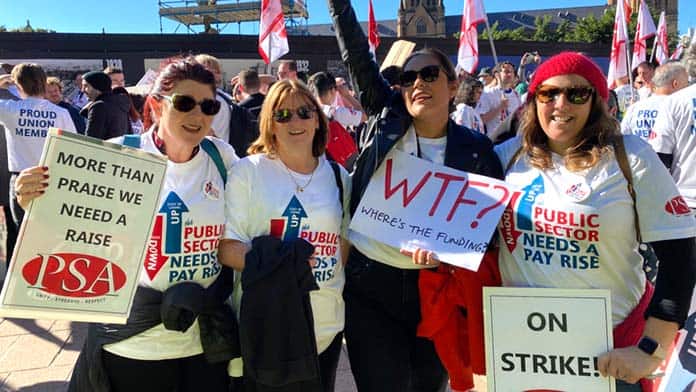Inflation is turning basic food items into luxuries, pushing up prices across the board and eating into workers’ living standards.
The current rate is 6.1 per cent but the Reserve Bank of Australia (RBA) expects it to rise to 7 per cent by the end of the year.
The bank has responded in classic capitalist style by hiking interest rates, aiming to slow the economy and reduce inflation at the cost of raising unemployment.
After holding its cash rate (the price at which it sells money to the retail banks) at 0.1 per cent from November 2020 to April 2022, the RBA has raised the rate to 1.35 per cent—and everyone expects that to go much higher.
That directly affects mortgages. While many established home-buyers have built up a buffer by paying more than the minimum, anyone who has recently bought a home at the top of the market with a huge mortgage is facing a world of pain.
If the cash rate hits the forecast 3.35 per cent by November, someone with a $500,000 mortgage will have seen their monthly repayments rise by $909 in just seven months.
But many workers, including renters, are already struggling. Rents, petrol and house building costs have skyrocketed by much more than the official inflation rate. Food is much more expensive, too—particularly fruit and vegetables.
What’s to blame?
The classic establishment response to inflation is to blame “greedy workers” pushing up wages, in turn fuelling price rises.
But the ruling class is not pushing this argument with any great conviction for one obvious reason: wages have been behind inflation for at least three years.
So when Sky News business editor Ross Greenwood calls for the government to act on wage expectations, he isn’t talking about past pay rises creating inflation but his prejudice that workers defending themselves might make things worse.
Even Treasurer Jim Chalmers said there was no credible forecast that suggested wages could keep up with inflation.
So if inflation isn’t being fuelled by workers’ pay rises, what is causing it?
A major factor has been the disruption to supply chains resulting from COVID and western sanctions on Russia. Raw materials, components, minerals and grains have been in shorter supply, driving up prices.
But another has been the way capitalists have taken advantage of the situation to raise prices to boost their profits.
Dr Richard Denniss from the Australia Institute thinktank, told The Guardian: “Australia isn’t experiencing a wage-price spiral, it’s at the beginning of a price-profit spiral.
“The national accounts show it is rising profits, not rising costs, that are driving Australia’s inflation. While workers are being asked to make sacrifices in the name of controlling inflation, the data makes clear that it is the corporate sector that needs to tighten its belt.”
The Trading Economics site reports that corporate profits in Australia surged by 10.2 per cent in the first quarter of 2022 compared to the previous quarter.
“This was the fourth straight quarter of increase in business profits, and the strongest growth since the second quarter of 2020.”
CEOs aren’t holding back. The average bonus alone paid to chief executives of the top 100 companies last year hit a new high at $2.31 million each.
And their pay packets are obscene. At Afterpay, the two CEOs shared $264 million, with other top bosses picking up huge salaries—CSL, $58.9 million; Goodman, $37.1 million; Macquarie, $14.6 million; and Woolworths, $11.7 million.
Far from making further sacrifices, workers need to be taking the fight to the bosses for pay rises that at least match inflation and preferably go higher.
Too often, union officials are prepared to talk about “fair pay rises” and settle for effective pay cuts. In Victoria, teacher activists are campaigning for a fresh pay claim after officials earlier this year pushed through a deal offering a shameful 1.7 per cent a year, plus a 1 per cent bonus not built into permanent pay.
Public sector workers in NSW are right to demand that the Liberals’ pay cap of 3 per cent is scrapped. Meanwhile, teachers in the state’s religious and private schools are campaigning for a 10 to 15 per cent pay rise over two years.
Staff at the University of Sydney are demanding an above-inflation pay rise. Health workers stopped work in Perth over pay in the state with the lowest wage growth and the highest inflation rate in the country.
Inflation is a threat to every worker. It makes the need to fight, not sacrifice, ever more urgent.
By David Glanz






